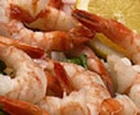|
Caribbean Entree
Citrus Shrimp
(Serves 4-6 )
An elegant shrimp dish, marinated in fresh lime and orange juices and flavored with orange liqueur.
Marinade
1/4 C vegetable oil
1/4 C fresh lime juice
1/2 C orange juice concentrate
2 T tequila *
1 T Cointreau or Triple Sec *
2 T fresh cilantro (chopped)
2 T fresh parsley (chopped)
2 cloves garlic (crushed or minced)
6 scallions (chopped)
1 tsp. salt
1/2 tsp. cumin
1/2 tsp. fresh ginger (minced)
1/4 tsp. turmeric
1/4 tsp. cayenne
1/4 tsp. black pepper
--------------
Shrimp
2 lb. fresh shrimp (shelled, leave tails on if you like)**
2-3 T vegetable oil
Marinade: Combine all ingredients in a bowl, mixing thoroughly. Add shrimp, cover, and chill for NO MORE than 1 hour (the citric acid will affect the shrimp).
Shrimp: Heat oil in a skillet. Drain shrimp and reserve marinade. Saute shrimp quickly, till they lose their transparency and become creamy white. Don't over cook. Remove to a platter and keep warm.
Assemble & Serve: Pour reserved marinade into skillet, turn up heat, and stir 5-8 minutes, reducing to a sauce. Lower heat, quickly toss shrimp back into skillet, stirring to coat. Mound shrimp on a platter surrounded by a ring of cooked rice and spoon the sauce over all. Serve immediately. Or let shrimp cool to room temperature, skip rice, and serve as an appetizer.
Serve with our Sweet Potato Chips, Pineapple Coleslaw, or Roti Flatbread.
* Simply leave the liqueur out if you don't want it. If you want, add 1 tsp. orange extract, if you have it.
** Buy 2 1/4 or even 2 1/2 lb. if the shrimp are in their shells when you buy them.
| See more Caribbean recipes |
|
|
Tips & Glossary
Caribbean cuisine is an exquisite blend of African, Asian, European, and Carib Indian (the area's original inhabitants) foods. Dishes are highly seasoned, either with a dry rub or marinade —or both. Below are some typical ingredients found in Caribbean food.
Callaloo: young leaves of either the taro root plant or amaranth used widely in Caribbean cooking. Spinach can be used as a substitute.
Spices: Allspice, bay leaves, black pepper, chives, chili peppers, cilantro, cinnamon, coconut, curry powder, escallion, garlic, ginger, lime, mace, nutmeg, onion, oregano, sugar, thyme, orange, tomato paste, vanilla, cayenne (red) pepper.
Jerk: Jamaican cooking method in which meat is rubbed, prior to grilling, with a blend of seasonings, often firey hot.
Jerk is also the name of the seasoning (from Spanish charqui, or dried meat). You can buy jerk in most grocery stores (even McCormick makes it), or can make and store your own.
• 1 T each—onion powder, garlic powder, dried chives, brown sugar; 2 tsp. each— (ground) allspice, nutmeg, cinnamon; 1 tsp. each—sage. thyme, salt, black pepper, cayenne (or more to taste). Mix thoroughly and store in a tightly covered jar.
There are thousands of versions; figure out what flavors you like most and add or subtract accordingly.
Typical meats: goat, pork, chicken, and some beef (though beef has tended to be expensive).
Fish: varieties that abound in surrounding waters, some familiar to us—grouper, cod, tilapia, blue marlin; others not so—200 species of jack, chip-chips (tiny clams), casadura (primitive armored catfish).
Native plant foods:
• ackee—peach-looking fruit with pulp like scrambled eggs
• annatto (achiote) seed
red coloring or flavoring agent w/ slightly sweet peppery taste.
• cassava (taro) root
• malanaga root
• scotch bonnet peppers
• breadfruit—fruit used like a potato in salads, stews, even whipped.
• passion fruit
More familiar foods:
bananas and plantains, okra, yams, papaya, mangoes, coconut, yams, sweet potatoes, rice, beans, corn and cornmeal.
|

